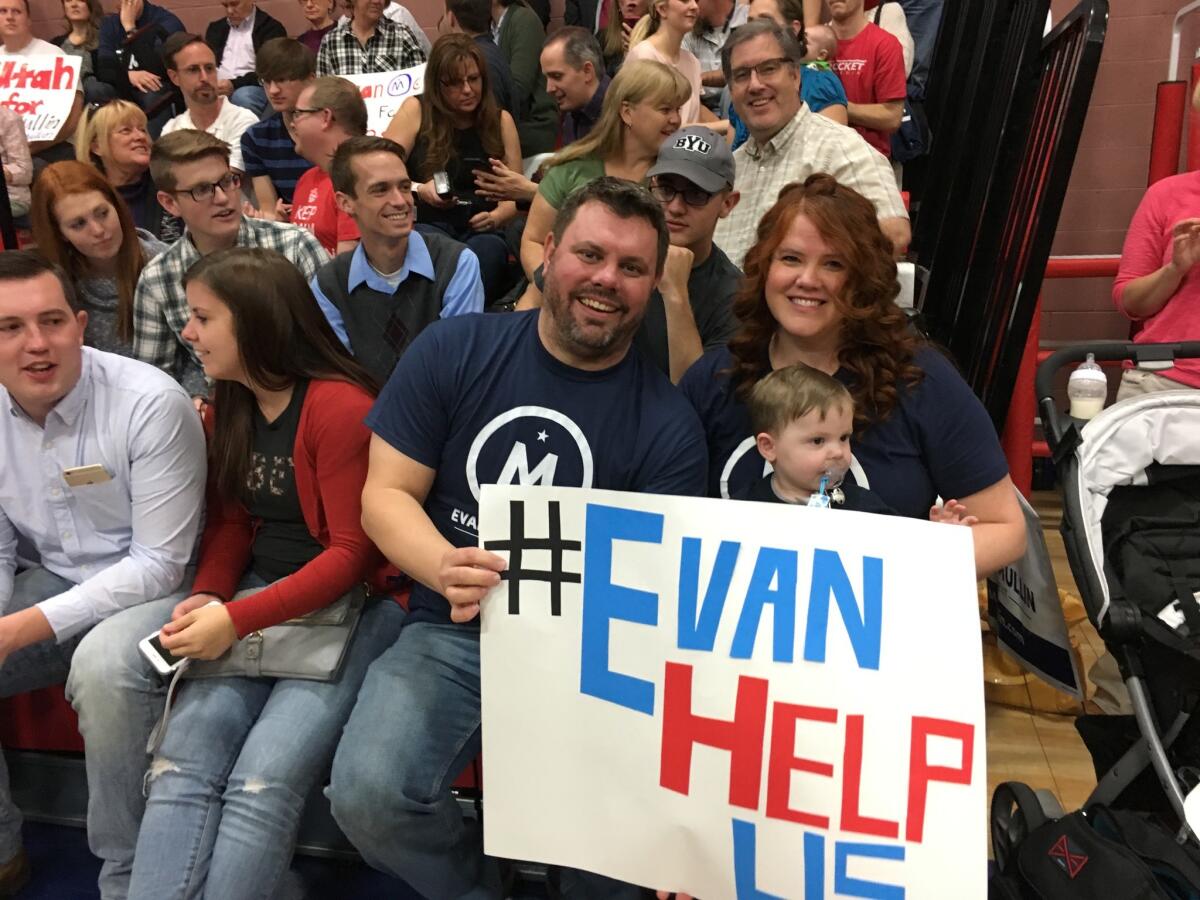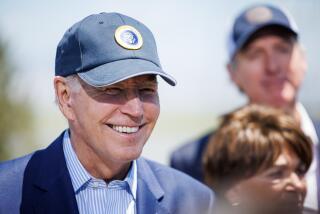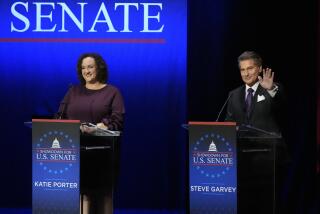Evan McMullin made Utah a presidential battleground. Next, he’ll try to transform conservative politics
Suburban, staunchly Republican Utah was an unlikely place for a packed, late-October presidential campaign rally, humming with the air of suspense of an up-for-grabs race.
But in an election year defined by its improbability, this state has become a battleground, thanks to the candidate whom hundreds turned out to see last week in a high school gym: Evan McMullin, a little-known policy wonk turned political sensation who suddenly has a credible shot to win Utah’s six electoral votes.
Such a feat would make him the first candidate outside the two major parties to win a state in a presidential election since segregationist George Wallace in 1968. McMullin, though, is aiming for more than a spot in obscure political trivia. He has cast his campaign as the start of a “new conservative movement,” offering a glimpse of the post-election identity crisis that awaits the GOP.
“We’re skeptical the Republican Party can make the kind of changes it needs to make in order to be a viable political vehicle for the conservative movement,” McMullin said in an interview. “But if they can’t, then we’ll have this movement and we may have to start something else.”
The 40-year-old jumped into the race in August with a more modest goal of offering refuge for Republicans turned off by Donald Trump.
“We wanted a place for conservatives to say, ‘I cast a vote in 2016 that I didn’t feel I had to take a shower in bleach after,’” said Rick Wilson, a veteran GOP strategist who is advising the campaign.
Most recently the chief policy wonk for House Republicans, McMullin also worked overseas on counterterrorism operations for the CIA and did a stint as an investment banker at Goldman Sachs.
A presidential bid was not the logical next step on his resume, he conceded. But after failing to persuade Republicans with more gravitas to challenge Trump, McMullin decided to run himself. Mindy Finn, a Republican digital strategist, joined the ticket as his running mate.
The shoestring campaign raised half a million dollars in two months, relying mostly on social media and word of mouth to boost visibility. McMullin is on the ballot in 11 states and is registered as a valid write-in option in about 30 more.
To actually win the White House, McMullin would need to pull off the implausible gambit of winning enough states to block either Trump or Hillary Clinton from reaching the 270 electoral votes needed to win. Under constitutional rules, that would then throw the choice to the House of Representatives.
With Clinton comfortably leading Trump in most polls, McMullin is quick to acknowledge that scenario is deeply unlikely. His case now largely rests on encouraging voters to send a message, particularly to the Republican establishment.
In Utah, where voters never fully warmed to either major-party candidate, the message resonates.
Utah has backed the Republican candidate for president for more than half a century. But Trump has struggled to win over Mormons, who make up nearly 60% of the state’s voters. For a while, Gary Johnson, the Libertarian nominee, made a strong showing in the polls. Residents also openly pined for alternatives such as Mitt Romney, the 2012 GOP presidential nominee, who now lives in Utah, is Mormon and ran the Winter Olympics in Salt Lake City in 2002.

“Utahns were genuinely searching,” said Boyd Matheson, president of the Sutherland Institute, a conservative think tank based in Salt Lake City.
McMullin, a Mormon who was born in Provo and attended Brigham Young University, was primed to capitalize on that dissatisfaction. He surged in Utah polls after a leaked “Access Hollywood” tape from 2005 revealed Donald Trump speaking crudely about groping women. McMullin framed his campaign as an exploration of principles — a discourse shared between friends and neighbors.
Attendees at his rally in Draper described a sense of catharsis in backing McMullin.
“I was depressed,” said Tiffany Sullivan, 36, about the presidential race. Her husband, Cecil, 39, said he planned to not vote.
Now, the two educators from Murray, a small city in the heart of the Salt Lake Valley, are self-described “McMullin hipsters,” backing the candidate before he became a phenomenon. They’ve attended four McMullin rallies so far, with 1-year-old son Michael in tow.
Some in the crowd expressed reservations that McMullin was still a relative unknown, or that a vote for him may hand Clinton a victory in the state.
“I wish it were as easy as saying I’m just going to vote for my principles,” said Cathy Cahoon, a 62-year-old domestic violence prevention educator. “But it’s not about voting for Donald Trump; it’s voting for what he would put into place,” such as conservative Supreme Court justices.
But, Cahoon said, if it looked like Clinton were set to win the presidency in a landslide, she’d cast her vote for McMullin.
Pacing the stage with a wireless mic as though he was giving a TED Talk on good government, McMullin laid out a platform of entitlement reform, expansive free trade and other small-government positions that defined the GOP until Trump upended the party with his populist appeal.
Recent surveys have McMullin tied or even leading in the state. He is performing particularly well with the 18- to 34-year-olds who make up around a third of Utah’s electorate.
McMullin has been making his pitch to the broader Mountain West, looking to states like Idaho and Wyoming as potential friendly territory. But Utah represents his best shot to notch electoral votes.
“He’s got some serious hometown advantage here,” said Scott Riding of the polling firm Y2 Analytics.
Polling indicates the race in Utah is, in Riding’s words, “a six-legged race” among Trump, Clinton and McMullin. The two major parties have ramped up their presence in the state. GOP vice presidential nominee Mike Pence visited Salt Lake City on Wednesday, and his Democratic counterpart, Tim Kaine, wrote an op-ed in the Deseret News touting his own Catholic missionary work.
Ultimately, McMullin’s candidacy may be less significant on Nov. 8 than what is to come after. His criticism is not limited to Trump or Clinton. One of his most popular riffs at the Draper rally was a skewering of members of the Republican establishment, whom he depicted as kowtowing to Trump for fear of losing a shot at a Cabinet post, or shrinking in the face of online harassment from Trump supporters.
The campaign is being waged by people who have built their careers in the GOP. But McMullin and Finn are remarkably sanguine about breaking away.
“I’ve burned some bridges,” said Finn. “But any bridges that I burned in this effort are ones that —“
“Need to be burned,” McMullin chimed in, finishing her sentence.
For national political news, follow @melmason on Twitter.
ALSO
Utah Republicans are sour on Trump, and Libertarians sense opportunity
Red vs. blue states: Check out our interactive Electoral College map
More to Read
Get the L.A. Times Politics newsletter
Deeply reported insights into legislation, politics and policy from Sacramento, Washington and beyond. In your inbox three times per week.
You may occasionally receive promotional content from the Los Angeles Times.







